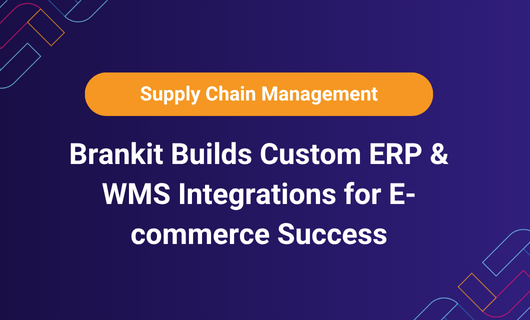
What is E-commerce Integration and Why It Matters in 2025?
E-commerce integration is the process of connecting online storefronts with backend systems such as Enterprise Resource Planning (ERP), Warehouse Management Systems (WMS), and Customer Relationship Management (CRM). It enables real-time inventory synchronization, integrated order processing, and centralized data management across all business operations.
In 2025, the speed of e- commerce demands seamless automation. Disconnected systems lead to errors, delayed fulfillment, and lost revenue. Modern eCommerce companies require scalable backend infrastructure to manage increasing volumes of orders, product SKUs, and multichannel sales touchpoints.
Without proper e-commerce integration, businesses face:
- Manual data entry and human error
- Inefficient order fulfillment
- Inventory mismatches across channels
- Fragmented customer data
A robust integration architecture enables brands to scale operations, reduce overhead, and deliver exceptional customer experiences.
Get a Free Consultation on e-commerce Integration Challenges
Brankit’s Approach to E-commerce ERP Integration
Brankit specializes in building tailored e-commerce ERP integrations for platforms like Shopify, Magento, WooCommerce, and marketplaces like Amazon and eBay. Our solution connects these platforms to ERP systems, including NetSuite, SAP, QuickBooks, and Microsoft Dynamics.
Our e-commerce ERP integration enables:
- Real-time sync of product catalogs and inventory
- Unified order processing across channels
- Centralized customer, payment, and shipment data
Through a deep understanding of each platform’s data structures and APIs, Brankit configures middleware solutions that act as an ERP-WMS bridge, streamlining every step of the commerce lifecycle.
Book a Demo to See Brankit’s ERP Integration in Action
API-First Strategy for Seamless e-commerce Integrations
Brankit champions an API-first strategy to power scalable and flexible ecommerce integrations. Our e-commerce API integration solutions are built to support automation, error handling, and future extensibility.
Custom APIs enable automation of tasks such as:
- Order creation and invoice posting in ERP
- Inventory deduction from the warehouse upon checkout
- Payment verification and reconciliation
We provide both native and platform-agnostic integrations. Where native APIs fall short, we develop custom middleware using RESTful architecture and modern security protocols.
Benefits of API-based automation:
- Reduce manual data entry
- Eliminate data duplication
- Accelerate processing speed
- Ensure real-time data accuracy
Explore Brankit’s API Capabilities for Seamless Automation
ERP and e-commerce Integration for Unified Data Flow
Aligning e-commerce platforms with ERP systems ensures a unified flow of data across:
- Inventory
- Sales & CRM
- Finance & accounting
Our ERP and e-commerce integration capabilities encompass SAP, NetSuite, QuickBooks, and other leading enterprise systems. Brankit customizes data mapping and process flows based on client needs, ensuring complete operational cohesion.
Example integrations:
- SAP e-commerce Integration: Sync orders, customer profiles, and warehouse data with SAP Business One.
- NetSuite e-commerce Integration: Real-time sync between Shopify and NetSuite for inventory, orders, and customer records.
- QuickBooks ERP Integration: Automatically record online sales as financial transactions for accounting teams.
Brankit’s integration middleware solutions simplify, scale, and ensure the error-free operation of complex data flows.
Talk to an ERP Integration Expert Today
Multi-Channel E-commerce Integration: One Dashboard, All Channels
Selling on multiple platforms introduces complexity. Brankit solves this with multi-channel ecommerce integration that consolidates all sales into one dashboard.
Supported channels include:
- Shopify
- WooCommerce
- Magento
- Amazon
- eBay
- Walmart
With Brankit’s unified sales channel data, you can:
- Monitor inventory across all channels
- Route orders to optimal warehouses
- Deliver consistent customer experiences
This real-time channel sync eliminates stockouts, prevents overselling, and maximizes fulfillment accuracy.
Request a Custom Quote for Your Multichannel Strategy
Payment, Shipping & POS Integration Services
E-commerce Payment Integration
Brankit ensures seamless payment gateway connectivity for platforms such as Stripe, PayPal, and Authorize.Net. Transactions are synced to ERP systems for automated accounting and reconciliation.
E-commerce Shipping Integration
Connect to major carriers like FedEx, UPS, DHL, and local logistics providers. Our e-commerce shipping integration provides:
- Live shipping rates
- Automated label generation
- Tracking updates
- Carrier performance data
POS E-commerce Integration
For hybrid retail models, our POS e-commerce integration connects physical store transactions to the same backend system, whether mobile or cloud-based. This ensures that inventory and customer data remain unified across all platforms.
See a Live Integration Example for Payments and Shipping
Our E-commerce Integration Platform & Services
Brankit’s e-commerce integration platform is built to support high-growth e-commerce businesses with flexible, secure, and customizable solutions. Our e-commerce integration services are trusted across industries for:
- Custom-built connectors: Tailored integrations, not off-the-shelf tools
- Scalable architecture: Support for growing product catalogs and sales volumes
- Dedicated support: 24/7 technical support and integration monitoring
- Compliance and security: Encrypted data transmission, secure API keys, and audit trails
Our service stack includes:
- Discovery & process mapping
- Integration blueprinting
- API & middleware development
- Testing & QA
- Deployment & support
Book a Demo Now to Learn More About Our Integration Platform
Platform-Specific Solutions
NetSuite e-commerce Integration
Brankit enables deep integration with NetSuite’s ERP suite, automating:
- Order-to-cash workflows
- Inventory allocation
- Customer record syncing
SAP e-commerce Integration
Our SAP integrations support Business One and SAP S/4HANA—sync real-time data between your eCommerce site and SAP backend.
ERP e-commerce Integration Across Systems
Brankit handles complex ERP ecommerce integration across platforms like:
- Microsoft Dynamics 365
- QuickBooks Enterprise
- Oracle Netsuite
- Infor ERP
We ensure all systems communicate effectively to support order fulfillment, finance, and customer engagement.
Request a Custom Integration Strategy for Your ERP
FAQs – Everything You Need to Know
What is e-commerce integration?
E-commerce integration connects online stores with backend systems, such as ERP, CRM, and WMS, to automate workflows and centralize data.
Why Do I Need E-commerce ERP Integration?
It reduces manual work, syncs inventory and orders in real-time, and helps scale operations with accuracy.
Can Brankit integrate my custom eCommerce platform?
Yes. We build custom APIs and middleware to connect bespoke eCommerce platforms with ERP and WMS systems.
How long does an integration project take?
Depending on the complexity, integrations typically take between 4 and 12 weeks. Our team provides detailed timelines during the discovery phase.
What if my ERP doesn’t have public APIs?
Brankit can work with flat files, custom connectors, or leverage third-party middleware to build the integration.
Final Takeaway – Scale Smarter with Brankit’s Custom e-commerce Integrations
In today’s omnichannel world, disconnected systems create operational friction. Brankit helps businesses build a seamless backend by integrating ERP and WMS with e-commerce platforms, enabling:
- Real-time inventory synchronization
- Integrated order processing
- Unified data across systems
Our e-commerce integration services are designed to minimize errors, save time, and help you scale more efficiently.
Schedule a Free Strategy Call with Brankit’s Integration Experts Today





